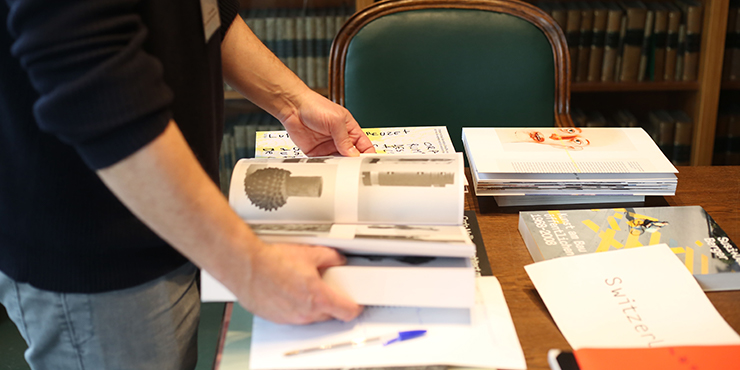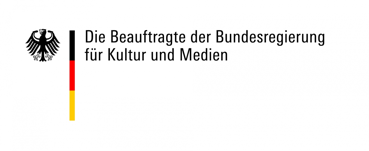Mr Scholze, last year there was a première: the publication of the German National Library's first digital annual report! What kind of feedback did you get from readers?
Our new annual report has been very well received. The combination of the digital format with a small analogue anchor, the abridged print version, came in for special praise. This shows that for all the progress being made with digitisation, we still like to have real objects that inspire us to read. This is where the concept of the new report has proven invaluable.
2023 was dominated by an important anniversary: 111 years of the DNB! What were the highlights of this special jubilee year marking the DNB's foundation?
We had more than 420 events, guided tours and hands-on activities at our two locations in Leipzig and Frankfurt am Main. Both locations held Open Days which drew thousands of visitors; they also had prize draws for bus excursions from Leipzig to Frankfurt am Main and vice versa. The Open Days stood out for me because of the focus on direct engagement.
In reality, however, the whole year was a highlight that left a lasting legacy – we collected "elevenies" sent to us by our visitors, friends and employees to mark our anniversary and published them in our blog. 611 of these short poems were submitted – that was fantastic! The blog also featured 111 stories told by 65 colleagues. Our warmest thanks go to everyone who rummaged through their personal and household archives and memories to find them!
Besides the 111, there was another memorable number: 50 million! Was this number of media works exceeded in 2023?
This milestone is actually still ahead of us. At the end of 2023, we had well over 49 million media works. What is remarkable is that around 14.9 million of them are available in digital format. Moreover, the number of digital publications increased by 2.5 million last year, around five times the number of new analogue works.
And there was yet another number to celebrate: 30 years of ILTIS! The integrated literature, sound recording and music publication information system ILTIS has now been in productive use for three decades. It is a well-known fact that even software ages, so what makes this library software so resilient?
Our motto "Nothing is permanent without change" is reflected in the regular hardware and software upgrades performed for ILTIS. What began in December 1993 with a TANDEM mainframe computer and the programming language Fortran has now – 30 years later – been totally revamped; these days, it uses the open-source operating system Linux and C programming language, while the latest version also has an open-source database.
Along with the central bibliographic component CBS (Central Bibliographic System), ILTIS also contains the cataloguing tools WinIBW and WebCat and the local systems for Leipzig and Frankfurt am Main. We have already begun consolidating ILTIS, and this work will continue over the next few years so that it is prepared for migration to a new library management system. After all, this is another way of understanding our motto: so that we will still be able to offer excellent central bibliographic services in 30 years' time.
COVID-19 has also precipitated change – not least at the workplace. There is now a "new normal" at the DNB which includes various mobile working formats. At the same time, you emphasise the importance of the physical element, the full benefits of which were reaped at the staff conference in 2023. How did it go?
There is no substitute for direct engagement. True to our motto "Together. Diverse", we got together in Frankfurt am Main on 4 and 5 July 2023 to work and enjoy ourselves. The positive impact of the face-to-face meetings, the great conversations and the wonderful atmosphere at our staff conference is still with us today. The conference was a good mixture of external stimuli, internal dialogue, information and discussion – with plenty of time for fun and celebration. We received a lot of information and ideas which will flow into the further discussion and development of our Strategic Compass 2035.
It could be said that the Strategic Compass will be the DNB's guiding light for the next few years. What is the Strategic Compass 2035 all about – and how do matters stand at present?
Our current Strategic Compass will remain in force until 2025. The Strategic Priorities described in this Compass cover the years from 2021 to 2024 – and also offer premonitions of what lies ahead. The strategic management team (SMT) accordingly got to work on the first plans for our future strategic development back in 2022. The members of the SMT started by forming a "Core Strategy Development Team 2035". Along with the directors and heads of each domain, this group includes persons from all departments and sections. A period of intensive work culminated in June 2023, when the group presented a result – the Strategic Compass 2035. Our Strategic Compass 2035 will be the basis for all further deliberations on Strategic Priorities and the individual measures to be derived from them. The guiding principles are automation, networking, user orientation and "meaningful work".
To what extent are staff who are not part of the core team involved in these strategic deliberations?
The Strategic Compass 2035 was also the basis of a World Café at the staff conference on 4 and 5 July 2023. Here we received more than 500 responses, which were reviewed and analysed – and will be taken into account later on in the strategy process.
Incidentally, the main difference from the Compass 2025 is that we now focus much more intensively on implementation and understand strategy as a process of continuous communication and negotiation.
Strategy is also needed in the area of sustainability. What has the DNB achieved in this respect over the last year?
Sustainability is intrinsic to our mandate to preserve Germany's cultural heritage. We also believe it is our social responsibility to protect our planet. Our Earth has limited resources, but we have the power to turn things around. In 2019, a state of climate emergency was declared in Leipzig, the city in which the German National Library was founded. The DNB is realising a combination of measures. The switch to LED lighting, for example, has reduced our energy consumption by 27% over the last five years. A photovoltaic system is to be installed at our location in Frankfurt am Main and will enable us to generate approx. 50% of our energy supply ourselves during the warm summer months. We also have our own cogeneration system (combined heat and power plant) which generates around 30% of the electricity consumed during the period when heating is required. Parts of our building in Leipzig are already supplied with renewable energy from a geothermal plant. Plans for stack and server extensions like those currently being realised in Leipzig are designed with sustainability in mind right from the outset so that construction and renovation work can be carried out in an energy-efficient manner.
Is there a strategic superstructure for the DNB's sustainability endeavours?
Yes, while developing our strategy for the years up to 2035, we made sustainability one of the values which form the bedrock of our daily activities and planning. For us, sustainability is not a task; it is a position which we have adopted and to which we are committed. It is our constant companion in all the tasks and projects we undertake and the themes we address. A sustainability working group was formed in the autumn of 2023 with this goal in view. It comprises members of all the German National Library's domains and departments and develops proposals designed to foster the German National Library's development as a sustainable institution.
Finally, let us talk briefly about the programme for management staff. In your last report, you mentioned "management staff as multipliers of satisfaction and motivation". What was achieved in this respect in 2023?
With DNB@Campus Management, we have launched a comprehensive management programme which lasts two-and-a-half years and is being delivered in cooperation with Frankfurt University of Applied Sciences. DNB@Campus is a training programme for all our management staff and consists of modules with coordinated content. Besides teaching the basics, it gives our staff a deeper knowledge of current management topics and puts people front and centre. True to the motto "Strong alone – strong together", we are continuing to develop as a learning organisation. The first two cohorts have already started; the third, in which I am also taking part, will follow in 2024.
Discover the numerous Elfchen ("elevenies") and browse through 111 stories about the German National Library!
Last changes:
04.06.2024







